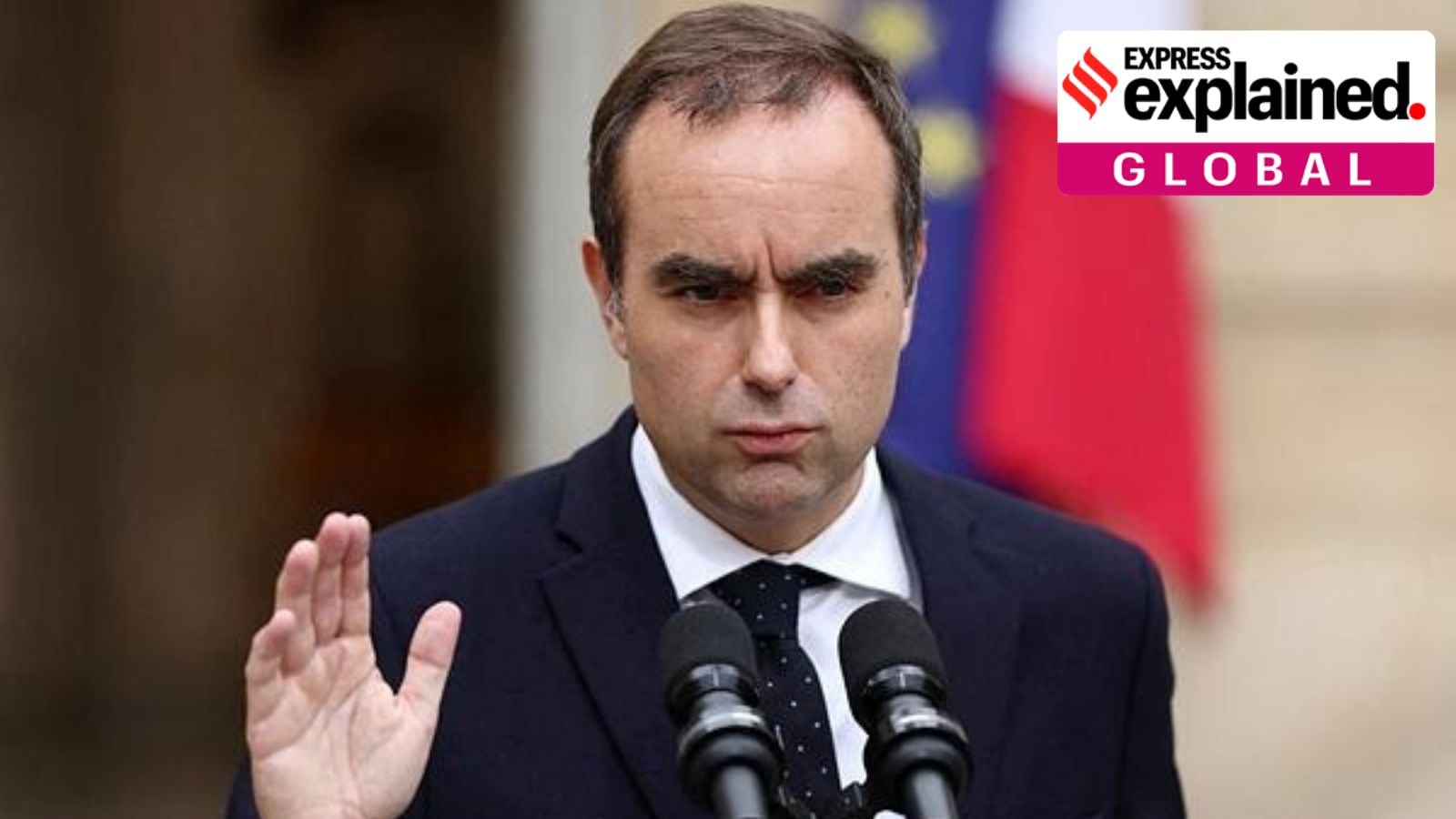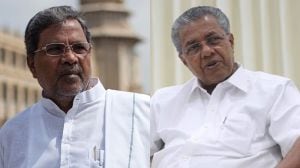Why Sebastien Lecornu resigned less than a month after becoming French PM
Macron government crisis, Sebastien Lecornu resignation: Lecornu, who was sworn in on September 9, is now the shortest-serving Prime Minister since 1958. He was also the fifth Prime Minister in two years under Macron, whose second term in office has been marred by political instability
 Sebastien Lecornu resignation: French outgoing Prime Minister Sebastien Lecornu, who presented his government's resignation to the French president this morning, delivers a statement at the Hotel Matignon in Paris, France, October 6, 2025. (Reuters)
Sebastien Lecornu resignation: French outgoing Prime Minister Sebastien Lecornu, who presented his government's resignation to the French president this morning, delivers a statement at the Hotel Matignon in Paris, France, October 6, 2025. (Reuters)Sebastien Lecornu resignation: In an encore of events barely a month ago, French Prime Minister Sebastien Lecornu and his new cabinet handed in their resignations on Monday (October 6), the presidential palace announced.
The announcement comes 14 hours after the cabinet was sworn in, and met with swift and fierce criticism across the political spectrum, especially by members of parties within the governing coalition.
It was virtually identical to that of his predecessor, François Bayrou, who resigned last month after losing a confidence vote that saw the government collapse and a political crisis.
Lecornu, who was sworn in on September 9, is now the shortest-serving Prime Minister since 1958, having served only 27 days. He was also the fifth Prime Minister in two years under Macron, whose second term in office has been marred by political instability.
Who is Sébastien Lecornu?
Before his appointment, Lecornu, 39, was the youngest defence minister in French history. He is a former conservative who joined Macron’s centrist Renaissance Party in 2017. He was also the longest-serving sitting minister in Macron’s government since 2022.
When the yellow vest movement against social injustice erupted in 2018, Macron chose Lecornu to lead the countrywide “great debate” in a bid to defuse tensions. As defence minister, he championed a whopping €413 billion defence spending package for 2024-30 to modernise France’s defence infrastructure, spurred by Russia’s war with Ukraine.
In appointing a loyalist, Macron signalled his intent to maintain continuity as well as pursue his pro-business budget, which advocates for some austerity measures.
Why Lecornu resigned
At the outset, the cabinet formation proved to be divisive both to allies and opponents. Parties across the spectrum viewed the formation of the new 18-member cabinet, which retained 12 members from Bayrou’s term, as indicating a lack of renewal, Euronews reported.
According to Euronews, the conservative Republicans Party was outraged at the appointment of former Economy Minister Bruno Le Maire as the defence minister. Other parties were angered by how 12 ministers of the new cabinet had served in Bayrou’s cabinet before his resignation.
Lecornu, like his predecessors François Bayrou and Michel Barnier, had been tasked with overseeing the French government through the impending economic crisis and had sought to obtain cross-party consensus. While previous prime ministers had bypassed parliamentary approval to pass budgets, Lecornu sought to secure cross-party consensus on passing the slimmed-down budget amidst the deep political divisions in parliament.
To this end, he had held extensive consultations with political parties across the board before announcing his cabinet on Sunday.
The roots of the political instability
The present crisis did not emerge overnight, and dates back to June 2024, when President Macron took a gamble and called for snap parliamentary elections, just two years after he was re-elected. The president’s Renaissance party had faced a bruising loss in the European Parliament vote, which took place earlier that year. He had then hoped to achieve “a clear majority in serenity and harmony”.
The July elections resulted in a hung, divided Parliament — the National Assembly — split between three groups. The left alliance, which won the most seats, fell far short of a majority. The far-right National Rally got the most votes, but does not have a majority. Macron’s centrist coalition lost seats, but it is a significant third bloc.
This has made it difficult for any Prime Minister to garner the necessary support to pass Bills and the yearly budget. For instance, Barnier, appointed as the Prime Minister last September, lasted only three months until he was ousted over the budget. Bayrou, his successor, was forced to resign just under nine months after he came to office last December.
Bayrou’s minority government had called for €44 billion of budget cuts to tackle France’s mounting public debt. He had argued that to tackle the French debt crisis, slashing government spending was imperative.
The French debt crisis
For decades, France’s government has spent more money than it has generated. This has forced the country to borrow to cover its budget.
In early 2025, the government said that its public debt stood at €3,345 billion, or 114% of the country’s GDP. This is third only to “the highest public debt in the eurozone after Greece and Italy, and equivalent to almost €50,000 per French citizen, according to a report by the BBC.
The budget deficit last year was 5.8% of GDP, while the corresponding figure is likely 5.4% for this year.
France also has an ageing population, with fewer workers being taxed and more citizens drawing the state pension, resulting in massive public spending. Bayrou viewed generous social programmes, such as state pensions, as having put France on “life support” and addicted to spending.
However, attempts to curtail social benefits have been politically challenging in France, as evidenced by conflicts in 2023 over Macron’s decision to raise the retirement age to 64 from 62.
What happens now
Macron now faces two options: appoint a new Prime Minister or hold fresh parliamentary elections.
Naming a successor to Lecornu may prove to be a protracted task, given that he would need to find a candidate interested in maintaining continuity of his policies, despite their widespread unpopularity. He would also need to find someone sufficiently unobjectionable to at least some of the parliamentary opposition. The President took a week to appoint Barnier and Bayrou, while Lecornu was named within a day of his predecessor’s resignation.
While the far-right National Rally, led by Marine Le Pen and Jordan Bardella, have long called for early parliamentary elections, there is a strong view that a new vote would change little on the ground.
Far-left parties have called for Macron’s resignation, but he has rejected the idea.
- 01
- 02
- 03
- 04
- 05






































